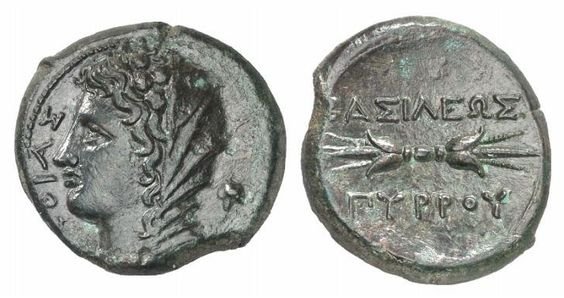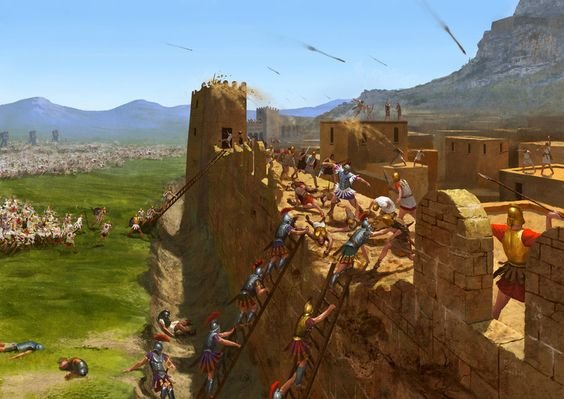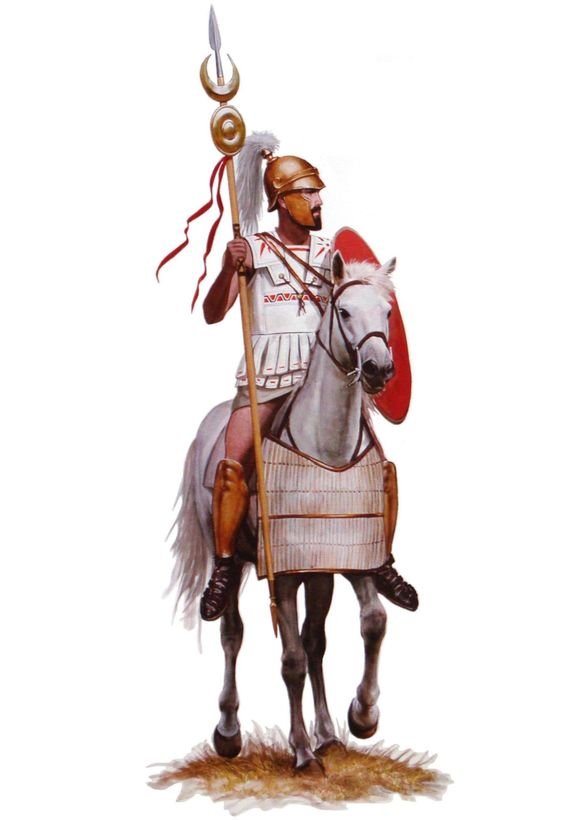Since the beginning of the "Pyrrhic War" the Roman Republic was defeated in two battles, first at the battle of Heraclea in 280 BC and a year later at the battle of Asculum.
In the Greek world, two victories were usually sufficient to finish a war, but the Romans seemed incapable of realizing that they had lost.
There were also complaints in Pyrrhus' own army, and his physician offered the Romans to kill the king. The consuls of 278, Gaius Fabricius Luscinus and Quintus Aemilius Papus, informed Pyrrhus about the man's intentions, adding the famous joke that the king "seemed to be incapable of judging both his friends and enemies".
Pyrrhus could appreciate the Roman chivalry, agreed to an exchange of POWs, and when the Romans said they would leave Tarentum alone for some time, Pyrrhus announced something like an armistice, essentially sacrificing his allies, the Samnites and Lucanians, to Roman reprisals.

Coin of King Pyrrhus of Epirus minted in Syracuse 278 BC.
Source
The Romans may have been surprised that their enemy postponed the war for a while, but they did not know that Pyrrhus had received a call for help from Syracuse on Sicily, which was threatened by the Carthaginians, and a call for help from Macedonia and Greece, which were attacked by Celtic tribes.
Pyrrhus was a man who craved for adventure so he decided to take the Sicilian offer,
soon after landing in Sicily, he lifted the Carthaginian siege of Syracuse and was proclaimed king of Sicily. He was already making plans for his son Helenus to inherit the kingdom of Sicily and his other son Alexander to be given Italy.
In 277 BC, Pyrrhus captured Eryx, the strongest Carthaginian fortress in Sicily. This prompted the rest of the Carthaginian-controlled cities to defect to Pyrrhus.
The Carthaginians were now forced to negotiate because they had been reduced to one stronghold on the island: Lilybaeum, modern Marsala.
Pyrrhus demanded that Carthage abandon all of Sicily and make the Libyan Sea a boundary between themselves and the Greeks but the Greek cities of Sicily opposed making peace with Carthage because the Carthaginians where still present in Sicily.

Siege of Eryx
Source
Pyrrhus eventually gave in to their proposals and broke off the peace negotiations by beginning the siege of Lilybaeum. For two months he launched unsuccessful assaults on the city, until finally he realized he could not mount an effective siege without blockading it from the sea as well.
Pyrrhus then requested manpower and money from the Sicilians in order to construct a powerful fleet. When the Sicilians became unhappy about these contributions he had to resort to compulsory contributions and force to keep them in line.
These measures culminated in him proclaiming a military dictatorship of Sicily and installing military garrisons in Sicilian cities.

Carthaginian cavalry
Source
These actions were deeply unpopular and soon Sicilian opinion became inflamed against the Epirot King.
Pyrrhus had alienated the Sicilian Greeks so much that they were willing to make common cause with the Carthaginians, seeing what had happened Carthaginians took heart and sent another army against him but this army was promptly defeated.
In spite of this victory, Sicily continued to grow increasingly hostile to Pyrrhus, who began to consider abandoning Sicily. At this point, Samnite and Tarentine envoys reached Pyrrhus and informed him that of all the Greek cities in Italy, only Tarentum had not been conquered by Rome.

Greek cavalry chasing down a fleeing Carthaginian soldier
Source
Pyrrhus made his decision and departed from Sicily, as he was leaving the island, he turned and said to his companions: "What a wrestling ground we are leaving, my friends, for the Carthaginians and the Romans".
The Syracusan fleet, which ferried him to Italy, was defeated by the Carthaginians in what was to be the last battle of the war. The Syracusans now regretted what they had done, but now it was too late.
The peace treaty, which was concluded not much later, was to last for only a decade. The inevitable conflict between Rome and Carthage, known as the First Punic War was sealed.

PREVIOUS EPISODE
https://steemit.com/italy/@seltkirk/the-first-great-test-of-the-roman-republic-1-2-the-mexican-standoff
Bibliography
*http://www.livius.org/articles/person/pyrrhus-of-epirus/pyrrhus-3/
*https://en.wikipedia.org/wiki/Pyrrhic_War#Battle_of_Heraclea
*http://www.livius.org/sources/content/plutarch/plutarchs-pyrrhus/pyrrhus-on-sicily/
*https://en.wikipedia.org/wiki/Pyrrhus_of_Epirus

Hi! I am a robot. I just upvoted you! I found similar content that readers might be interested in:
https://en.wikipedia.org/wiki/Pyrrhus_of_Epirus